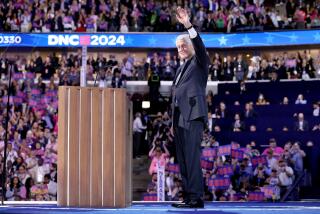Clinton Critical of Bush Policies
- Share via
BLACKPOOL, England — Former President Clinton delivered a folksy but frequently sharp critique of the Bush administration’s foreign policy Wednesday, telling an approving British audience that U.N. weapons inspectors should be given one last crack at uncovering any Iraqi weapons of mass destruction.
“I agree with many Republicans and Democrats in America and many here in Britain who want to go through the United Nations, to bring the weight of world opinion together to offer one more chance to the inspections,” Clinton said to Labor Party activists gathered in this Victorian resort town. “If the inspections go forward, and I hope they will, perhaps we can avoid a conflict.”
While agreeing with the administration that existing U.N. resolutions on Iraq “won’t do the job,” he noted that “it is important to remember that Britain and the United States made real progress with our international allies through the United Nations with the inspection program in the 1990s.”
“The inspectors discovered and destroyed far more weapons of mass destruction and constituent parts than were destroyed in the Gulf War,” Clinton said.
British Prime Minister Tony Blair had invited the former president to speak in Blackpool essentially as a character witness for his Iraq policy--a delicate high-wire act that balances London’s support for Washington’s threat to use force against Iraqi leader Saddam Hussein with the overwhelming desire in Blair’s country and Labor Party to work through the United Nations.
The two men formed a friendship during their overlapping time in office and still speak to each other about once a month, said a Blair advisor. But Clinton’s political value to the prime minister now, the advisor said, is that he “is still hugely popular with the Labor Party,” a swath of which is fiercely opposed to another Persian Gulf war.
It was a successful booking. Clinton threw his ex-presidential weight behind Blair, arguing that Blair is right to see Hussein as a threat, while repeatedly praising the prime minister for tempering the Bush administration’s instinct to deal with Iraq alone.
“I support the efforts of the prime minister and President Bush to get tougher with Saddam Hussein,” Clinton said. “I strongly support the prime minister’s determination if at all possible to act through the U.N.” Notably, he omitted Bush’s name from the latter statement.
Clinton’s 50-minute speech, though veiled in casual good humor and interrupted to introduce his traveling companion, actor Kevin Spacey, amounted to a raw attack on the man who replaced him in the Oval Office. While declaring broad support for Bush’s decision to confront the menace posed by Hussein, Clinton noted that he had “a world of disagreements” with the current administration, listing everything from its rejection of the Kyoto Protocol on climate change to the 2001 Republican-sponsored tax cut.
Many of his comments also carried personal overtones. Clinton recited a list of what he termed the West’s moral failures in Iraq, which he said helped prop up Hussein’s regime. Though not mentioning him by name, Clinton cited then-President George Bush’s handling of the period immediately following the 1991 Persian Gulf War, when U.S.-led coalition forces did not intervene while Hussein’s forces repressed a Shiite Muslim rebellion that Washington had encouraged.
“The Shiites of the southeast of Iraq were urged to rise up and then cruelly abandoned to their fate as [Iraqi forces] came in and killed large numbers of them, drained the marshes and largely destroyed their way of life,” Clinton said. “We can’t forget we are not blameless in the misery under which they suffer.”
Clinton argued that the remnants of the Al Qaeda terrorist network--not Iraq--pose the greatest threat to the United States at the moment. “I still believe our most pressing security challenge is to finish the job against Al Qaeda and its leaders, in Afghanistan and any other place that they might hide,” Clinton said.
Driving Hussein from power should ideally be achieved through “nonmilitary means,” he said.
The loudest applause was reserved for his swipes at what many in Britain see as America’s bullying style under Bush .
“You can’t have an integrated world and have your say all the time,” Clinton said. “America can lead the world” to a more interdependent era, “but we can’t dominate and run the world.”
More to Read
Sign up for Essential California
The most important California stories and recommendations in your inbox every morning.
You may occasionally receive promotional content from the Los Angeles Times.












